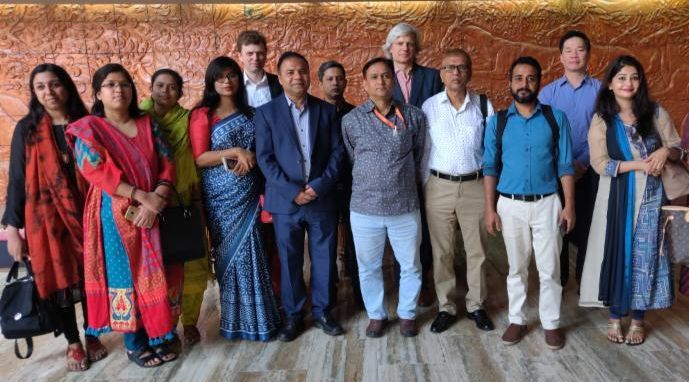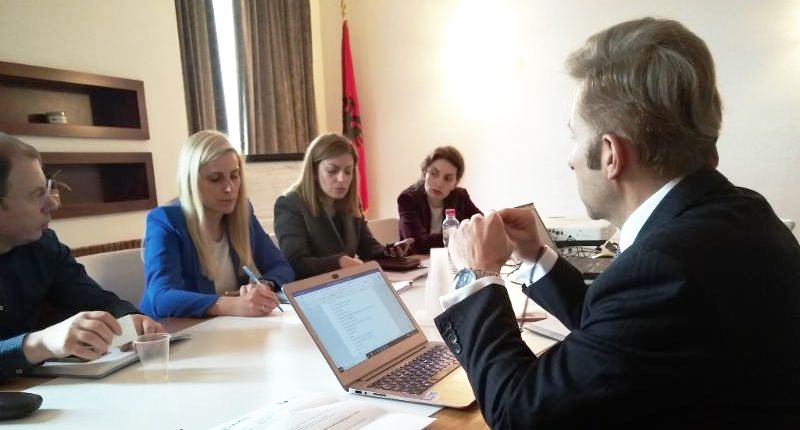Bangladesh: Increasing Input of Civil Society in the Budget Process
(Back row, from left to right) FSVC volunteer experts Guy Grenier and David Kallick, FSVC Director Edward Sia and participants; Dhaka, April 2019.
The Government of Bangladesh (GoB) has been seeking to increase public participation in the national budget process in recent years. To do so, the GoB published a Budget Booklet in 2015, a summary of the National Budget, to make it more accessible and reader-friendly to citizens. The GoB, however, has stopped publishing the Budget Booklet due to limited public interest. The Booklet was too technical and lengthy to be useful to the public.
To help the GoB address this issue and increase public engagement in the budget, FSVC organized a series of consultations in April with the GoB and CSOs to develop a Citizens Budget (CB). A CB is a simplified, non-technical representation of the National Budget.
FSVC first moderated a roundtable with CSOs to obtain their input on what the format and content of the CB should be. FSVC then shared this input with the staff of the Bangladeshi Ministries of Finance and Planning, and obtained their feedback on the template suggested for the CB.
As a result of this project, the GoB will now be able to develop and publish a more accessible CB with which to engage CSOs and the general public in the budget process. This will help increase government accountability and fiscal transparency in Bangladesh.
Albania: Assessing the Feasibility of Instant Payments
FSVC expert Domenico Scaffidi (right) with representatives of the Bank of Albania; Tirana, April 2019.
FSVC has built a strong relationship with the Bank of Albania (BoA) over the years, and has provided technical assistance to the BoA in a number of key areas, including most recently in instant payments.
Instant payments can help increase financial inclusion by making payments faster and more cost effective. Innovative payment infrastructures have been critical in increasing financial inclusion in other countries, bringing previously unbanked individuals into the formal financial sector, and instant payments could help do the same in Albania. The introduction of instant payments is therefore a key objective of Albania’s National Retail Payments Strategy.
To help the BoA meet this objective, in April 2019, FSVC assisted the management and staff of the BoA’s Payment Systems, Accounting and Finance departments in assessing the feasibility of implementing an instant payments solution in Albania. FSVC’s expert, in particular, helped the BoA understand the strategic as well as technical implications of this decision.
Angola: Strengthening Bank Compliance

FSVC volunteer experts Johannes Salzmann (left) and Kate Hotten (right) with a participant; Luanda, March 2019.
In recent years, Angolan banks have experienced significant losses in correspondent banking relationships due in part to stricter international standards in anti-money laundering and combating the financing of terrorism (AML/CFT) supervision frameworks. This situation has put a strain on the country’s US dollar reserves, and has negatively impacted economic growth.
To address this challenge, the Angolan Banking Association (ABANC), which represents 28 of the 30 authorized financial institutions in Angola, has requested FSVC’s assistance in strengthening AML compliance within the Angolan banking sector. In March 2019, FSVC organized a five-day workshop for AML compliance officers and risk managers at commercial banks in Angola. The FSVC volunteer experts covered topics including how to develop know-your-customer (KYC) and customer due diligence (CDD) programs internally, know-your-employee (KYE) and politically exposed persons (PEPs) procedures, as well as how to comply with United Nations sanctions.
As a result of this project, participants gained expert knowledge on how to adopt international standards in AML bank compliance and how to implement them in practice. This increased capacity will result in stronger banks, with updated compliance procedures and practices. This will help reduce their risk exposure and profile, and help Angolan banks rebuild connections with the international financial system.

